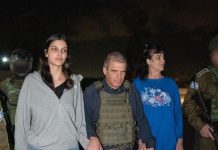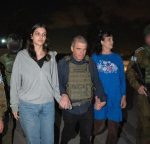By Hannah Reich Berman
Shavuos has just ended, and it was quick and easy. Quick because it was a two-day holiday, not a three-day event as it sometimes is, when Shabbos is the day before. And easy for the very same reason! Many families chose to prepare all dairy meals, thereby eliminating the necessity for the family cook to stand at a meat counter and pick from many different roasts. It is somewhat easier to select fish and to then move on to the produce department to pick out the freshest and best-looking vegetables. Moving forward, buying pasta is simple, since all that one needs to do is select the shape of her choice, or the shape that the cookbook said to use for a specific dish. The same is true of the cheeses and creams. Easy-peazy!
But all of that is just about food, and there is so much more to the chag that we just celebrated. It was not quite so easy for those who, as is the custom, chose to stay awake all night and learn Torah. Yours truly was staying at my daughter’s home, and while I retired at the reasonable hour of 11 p.m., that was not the case with the menfolk. That first night, 11 o’clock was just about the time that the guys in the family were getting ready to leave the house. Out the door they went, and they were not seen back home until many hours later.
Actually, they were not seen by me, since I went to sleep. What I learned the next day was that my son-in-law did not arrive home until 3 in the morning, and some of my grandsons walked in at about the same time. Another grandson did not walk through the door until 6 in the morning. But it is a mistake to assume that this is just what the menfolk do. My granddaughter also went out to learn at about 11 that night and, I was told, she did not return for several hours.
It seemed to me that the youngest of my grandsons chose where to go to learn based on what type of food was being served. How they knew the menu in advance I am not sure. But they did. Possibly they remembered it from the year before. Those in charge at the shuls and yeshivas where the learning takes place do not expect the men and boys to sit and learn all night without providing sustenance. So food is available for all. However, there is more to this all-night learning than actual learning.
Some of the younger teens are using this as a socialization event. They go where their friends go. Clearly, it is prearranged that they will hang out at a certain place. They do some learning, of course, but they also spend time schmoozing out in the lobby. The night seems to be divided into equal parts learning, socializing, and noshing. Nevertheless, it’s better than not learning at all. And who am I to criticize or judge, since I have never done it. Despite the fact that I am an insomniac, I could never, and would never, commit to staying awake all night. I give credit to all who do, the adults as well as the younger boys, regardless of how much learning they do.
But there is yet another side to things.
One of my grandsons called me the day after Shavuos, on Friday morning. He is studying at a yeshiva in Israel for the year, and he always calls me before Shabbos. He usually sounds spirited and upbeat, but not this time. He sounded somewhat lethargic, so I was concerned and asked him if something was wrong. “No, Savta, nothing is wrong,” he said. Not one to let things go, I persisted. I asked why he sounded so tired.
His answer floored me: “A group of us didn’t just stay up all night learning for one night–we did it twice. We stayed up for two nights.” For a few seconds I was speechless. Then I asked why in the world they did that. He gave me an answer, but I was so perturbed that my beloved grandchild went for two full nights without sleep that I did not fully grasp his explanation. If memory serves me correctly, what he said was something along the lines of “If one night of learning is good, then two nights are better.”
There was nothing for me to say. But I was not happy. I kept my big mouth shut despite feeling the inclination to say that if he felt that way, why doesn’t he fast two days for Yom Kippur? But since I know that the two are not the same, I wisely kept my sarcasm to myself and said nothing of the sort. One is required to fast only that one day of Yom Kippur, and fasting for a second day would be meaningless. But there is no reason why a devoted individual cannot or should not learn for two nights.
Although I did not like what he had done, I had no choice but to accept it. This grandson had called me because he is a devoted and loving boy, but he did not ask my opinion on the matter. It was not my business to criticize or reprimand him for going without sleep for two nights. I had to remind myself to relax and just be proud of his devotion.
For a long time now, I have had to watch what I say to my children. Parents of adult children quickly learn that advice should not be given unless it is asked for. However, things just got a little tougher. Now that so many of my grandchildren are young adults, I need to follow the same rule with them. While I was unhappy that this grandson went so long without sleep, I managed to keep my mouth shut. It was not easy, but I did it–because that’s just the way things are and that’s just the way it is!
Hannah Berman lives in Woodmere and gives private small-group lessons in mah-jongg and canasta. She can be reached at Savtahannah@aol.com or 516-295-4435.















